英国economy
英国经济英语作文
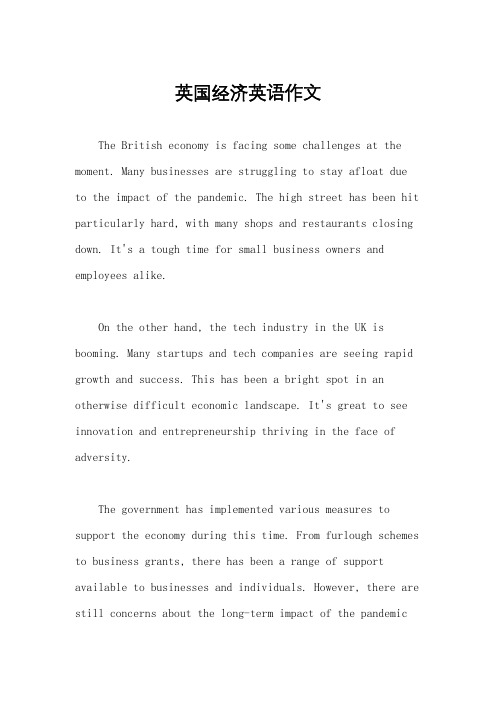
英国经济英语作文The British economy is facing some challenges at the moment. Many businesses are struggling to stay afloat due to the impact of the pandemic. The high street has been hit particularly hard, with many shops and restaurants closing down. It's a tough time for small business owners and employees alike.On the other hand, the tech industry in the UK is booming. Many startups and tech companies are seeing rapid growth and success. This has been a bright spot in an otherwise difficult economic landscape. It's great to see innovation and entrepreneurship thriving in the face of adversity.The government has implemented various measures to support the economy during this time. From furlough schemes to business grants, there has been a range of support available to businesses and individuals. However, there are still concerns about the long-term impact of the pandemicon the economy.Brexit has also had a significant impact on the British economy. The uncertainty surrounding trade deals and regulations has created challenges for many businesses.It's still unclear what the full impact of Brexit will be, but it's likely to continue shaping the economic landscape for years to come.Overall, the British economy is facing a complex set of challenges. While there are some bright spots, there are also significant struggles for many businesses and individuals. It's a time of uncertainty and change, and the full impact of recent events is yet to be fully understood.。
英国经济介绍the UK economy

She carried out an extensive programe of privatisation Throughout the 1980s.
Many state-owned enterprises became privately owned under this policy.
State-owned →→→ privately owned
★the Prime Ministership of Margaret Thatcher ★the ‘New Labour’ government came to power in 1997
Today
UK’s economy is one of the Europe’s largest system. It is a developed nation that now stands at a risk of being seriously affected by recession. Recent UK GDP economic data reveals a lot about Exports and imports how Global Economic Crisis of 2008 has AFFECTED its economy.
Inflation
Consumer price index annual inflation in UK was around 4.1% in November 2008.
Tips: CPI-consumer price index 消费物价指数 RPI-retail price index 零售物价指数
telecom
英国石油公司 Associated British Ports 英国联合港口公司
英语国家社会与文化入门 英国 economy
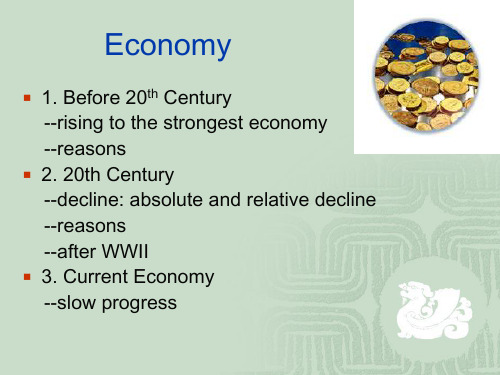
European Union: 欧洲联盟,简称欧盟 是当今世界一体化程度最高的区域政治、经 济集团组织。其前身是1958年成立的欧洲共 同体(European Community, EC),即欧洲经 济共同体(European Economic Community, EEC)、煤钢共同体(European Coal & Steel Community, ECSC)和原子能共同体 (European Atomic Energy Community, EURATOM)的统称。1993年11月,《欧洲 联盟条约》(又称《马斯特里赫特条约》, The Maastricht Treaty)生效,欧共体演化为 欧洲联盟。
Exchange rate
UK Ireland US
$13.2 trillion (2006, 1st)
$46,000 (2006)
Canada
$1.165 $35,200 trillion (2006) (2006 12th) $645.3 $34,369 billion (2006) (2006 17th) $103,873bil $29,698 lion (28th) (2006, 53th)
Country
GDP (total) US$ $2.1 trillion (6th)
GDP (per capita) $3,500 (2006) $41,000 (2005)
Annual growth rate 3.1% (2007) 8% 4% (2007) 2.8%
Monetary unit Pound Sterling Euro USD
Economy
1. Before 20th Century --rising to the strongest economy --reasons 2. 20th Century --decline: absolute and relative decline --reasons --after WWII 3. Current Economy --slow progress
The-UK-Economy-英国经济精品PPT课件
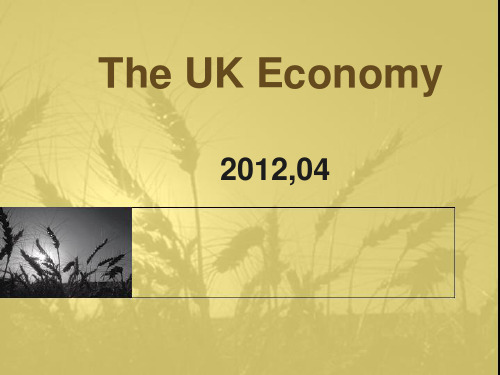
36698美元
2.6%
• 04 CHINA
28792.26亿美元
2177美元
11.4%
• 05 UK
24718.72亿美元
40669美元
2.9%
• 35 HONG KONG 2045.02亿美元 29298美元 5.8%
Second, the era of empire was over. the independence of its colonies makes Britain lose big markets for British goods, and the independent colonies stopped providing raw materials to the UK, leaving Britain as just a medium-size European country.
this period as one of decline?
The Reasons for the Relative Decline of UK Economy
First, after World War II, the UK had gone heavily into debt in order to finance the war, selling many of its accumulated overseas assets, and borrowing large amounts from the US and Canada.
• From 1945 until the present, the story of the UK economy is usually thought of as one of decline.
英语国家社会与文化入门(上册)汉语译文之英国UKeconomy
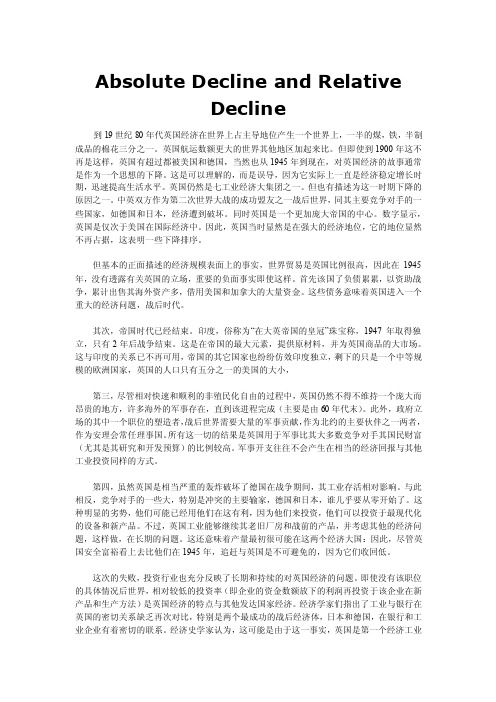
Absolute Decline and RelativeDecline到19世纪80年代英国经济在世界上占主导地位产生一个世界上,一半的煤,铁,半制成品的棉花三分之一。
英国航运数额更大的世界其他地区加起来比。
但即使到1900年这不再是这样,英国有超过都被美国和德国,当然也从1945年到现在,对英国经济的故事通常是作为一个思想的下降。
这是可以理解的,而是误导,因为它实际上一直是经济稳定增长时期,迅速提高生活水平。
英国仍然是七工业经济大集团之一。
但也有描述为这一时期下降的原因之一。
中英双方作为第二次世界大战的成功盟友之一战后世界,同其主要竞争对手的一些国家,如德国和日本,经济遭到破坏。
同时英国是一个更加庞大帝国的中心。
数字显示,英国是仅次于美国在国际经济中。
因此,英国当时显然是在强大的经济地位,它的地位显然不再占据,这表明一些下降排序。
但基本的正面描述的经济规模表面上的事实,世界贸易是英国比例很高,因此在1945年,没有透露有关英国的立场,重要的负面事实即使这样。
首先该国了负债累累,以资助战争,累计出售其海外资产多,借用美国和加拿大的大量资金。
这些债务意味着英国进入一个重大的经济问题,战后时代。
其次,帝国时代已经结束。
印度,俗称为“在大英帝国的皇冠”珠宝称,1947年取得独立,只有2年后战争结束。
这是在帝国的最大元素,提供原材料,并为英国商品的大市场。
这与印度的关系已不再可用,帝国的其它国家也纷纷仿效印度独立,剩下的只是一个中等规模的欧洲国家,英国的人口只有五分之一的美国的大小,第三,尽管相对快速和顺利的非殖民化自由的过程中,英国仍然不得不维持一个庞大而昂贵的地方,许多海外的军事存在,直到该进程完成(主要是由60年代末)。
此外,政府立场的其中一个职位的塑造者,战后世界需要大量的军事贡献,作为北约的主要伙伴之一两者,作为安理会常任理事国。
所有这一切的结果是英国用于军事比其大多数竞争对手其国民财富(尤其是其研究和开发预算)的比例较高。
Economy 英国文化 修改后
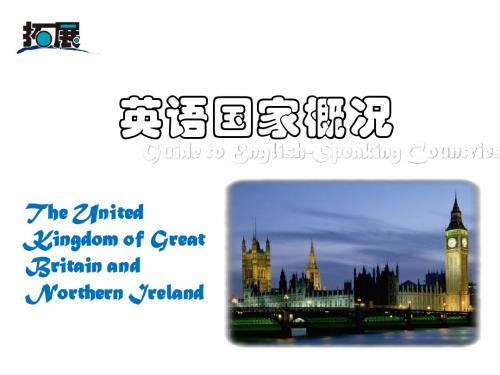
Policies政策 (1979-1997)
Policies (1979-1997)
“In politics if you want anything said, ask a man. If you want anything done, ask a woman.”
在政治上,如果你想要有所表示,问的人。如果你想成 就任何事,问一个女人。”
充当银行家都对政府和商业银行
aims to maintain the integrity and value of the currency, maintain the stability of the financial system and ensure the effectiveness of the financial services sector.旨在维持完整性和升值,保持稳定的金融体系的有
经历了一段时间的巨大困难和相对的经济衰退。
Growth and Decline
Causes
two World Wars—great economic loss, heavily in debt.经济损失,背负着沉重的债务。 the era of the British Empire was over— decolonization非殖民地化 (losses of raw material损失 的原材料 & market) military expense (until the process of decolonization completed in the 1960s)
国燃气(BG)
Services industries
服务业
• Services industries, especially, business and financial services—the strongestperforming sector in the UK economy服务业,商业和金融服务的运输最强板块在英国经济 • London—the strongest performing region in the UK在英国的最强的表演区域
英国经济的发展历程
英国经济的发展历程The development of the British economy has a long and rich history that spans several centuries. From its beginnings as a predominantly agricultural nation to becoming one of the world's leading industrial and financial powers, the British economy has experienced significant growth and transformation.The early stages of the British economy were characterized by agriculture and trade. During the Middle Ages, England emerged as a major producer of wool, which was in high demand across Europe. The growth of trade led to the establishment of markets and the formation of guilds, which further contributed to the development of the economy.The Industrial Revolution, which occurred in the late 18th and early 19th centuries, marked a turning point in the history of the British economy. It brought about a shift from an agrarian to an industrial society, with the adoption of new technologies and the rise of factories. Key industries such as textiles, iron and coal mining, and steam power flourished during this period. The development of the railway network also played a crucial role in connecting different parts of the country and facilitating trade. The British Empire, which at its height encompassed a quarter of the world's landmass and population, played a significant role in the expansion and prosperity of the British economy. Colonies provided valuable resources such as cotton, sugar, and tea, which fueled the growth of industries back in Britain. The empire also served as a vast market for British goods, further boosting economic activity. The wealth accumulated from the coloniescontributed to the development of infrastructure and the establishment of financial institutions, making London the global financial center.However, the decline of the British Empire after World War II coincided with economic challenges for the country. The cost of maintaining colonies and the rise of nationalist movements led to decolonization, reducing Britain's access to colonial markets. Additionally, the devastating effects of the war left the British economy in ruins, with shortages of essential goods and high levels of debt.In the post-war period, the British government adopted a policy of mixed economy, with a combination of state intervention and private enterprise. The welfare state was established, providing social benefits such as healthcare and education to all citizens. The nationalization of key industries such as coal, gas, and electricity aimed to ensure their efficient management and address inequalities.In the late 1970s, the British economy faced another crisis characterized by high inflation, rising unemployment, and industrial unrest. This led to a shift towards neoliberal policies under the leadership of Margaret Thatcher. The government took measures to reduce the power of trade unions, deregulate industries, and privatize state-owned enterprises. These reforms aimed to enhance competition, increase productivity, and attract foreign investment.Since then, the British economy has experienced periods of growthand recession, influenced by global economic trends and domestic policies. The financial services sector, centered in the City of London, has become a significant driver of economic activity. The country has also diversified its economy, with strong sectors in manufacturing, technology, and creative industries.In recent years, the UK's decision to leave the European Union, known as Brexit, has created uncertainty and posed challenges to the economy. The long-term impact of this decision is yet to be fully realized.In conclusion, the development of the British economy has been shaped by a complex mix of factors including agriculture, trade, industrialization, colonialism, and government policies. It has evolved from a primarily agricultural society to a global economic power, with both periods of prosperity and challenges along the way. The future of the British economy will continue to be influenced by global dynamics and the country's ability to adapt and innovate.。
英文作文英国经济
英文作文英国经济The British economy has been facing some challenges in recent years. The uncertainty surrounding Brexit has had a significant impact on businesses, with many choosing to delay investment decisions until there is more clarity on the UK's future relationship with the EU.The service sector is a key driver of the UK economy, accounting for around 80% of GDP. However, the manufacturing sector has been struggling, with many companies feeling the effects of global trade tensions and a slowdown in the global economy.The UK government has been taking steps to boost the economy, including increasing public spending on infrastructure projects and providing support for businesses through tax breaks and incentives.Despite these challenges, the UK economy has shown resilience, with unemployment at its lowest level indecades and wages starting to rise. However, there arestill concerns about the impact of Brexit and the potential for further economic disruption.Overall, the British economy is facing some tough challenges, but there are also opportunities for growth and development. It will be important for the government to continue to support businesses and provide a stable environment for investment in order to ensure long-term prosperity.。
英国经济介绍 Economy
All these accounted for 10% of GDP. Owing to mismanagement and low efficiency, the Conservative governments between 1979 and 1996 denationalized oil companies, telecoms, gas, airlines, electricity, railways and water supply.
2 The Public Sector
The public sector refers to state-owned enterprises. The Labor government nationalized a number of big business soon after the Second World War, introduced a fromcradle-to-grave welfare system and extended its controls over banking and the money supply.
The system of free enterprise is mainly based on the theory first systematically expounded by British philosopher and economist Adam Smith (1723 – 1790) in his masterpiece An Inquiry into the Nature and Causes of the Wealth of Nations, which was first published in 1776.
英美国家概况 译文Unit 5 The UK Economy (英国的经济)
4) causes for the relative decline 相对衰退的原因
① Britain has gone into heavy debt to finance the war (selling many accumulated overseas assets, borrowing large amounts from the US and Canada) 为了给战争筹集资金,英国已经背上了沉重的债务
② British colonies which used to provide raw materials and big markets gained independence —the end of the era of empire. 过去常常为英国提供原材料和广阔市场的英国殖民地纷纷独立。
Summary of the decline:
The UK has experienced an economic decline since 1945. but this is a relative decline rather than an absolute one. Britain is wealthier and more productive than it was in 1945, but since other countries developed more rapidly, it has slid from being the 2nd largest economy to being the 6th.
2) By 1900, overtaken by the U.S and Germany.
一直到19世纪80年代,英国经济一直在世界上居于主导地位。但是到20世纪时,它被美国和德国超过。
- 1、下载文档前请自行甄别文档内容的完整性,平台不提供额外的编辑、内容补充、找答案等附加服务。
- 2、"仅部分预览"的文档,不可在线预览部分如存在完整性等问题,可反馈申请退款(可完整预览的文档不适用该条件!)。
- 3、如文档侵犯您的权益,请联系客服反馈,我们会尽快为您处理(人工客服工作时间:9:00-18:30)。
Measures taken by Mrs. Thatcher''s government to improve the economy Mrs. Thatcher''s government took numerous measures to improve the efficiency of the economy during the past decade, using both macroeconomic and microeconomic policies.
British Literature and Culture
English literature began with the AngloSaxon settlement in England. The study of English literature usually begins with the Anglo-Saxon epic poem Beowulf.
New Industries New industries include microprocessors and computers, biotechnology and other high-tech industries. There are three areas in Britain which have seen some high-tech industrial growth: (1).the area between London and South Wales, (2).the Cambridge area of East Anglia and (3).the area between Glasgow and Edinburgh in Scotland. The third area is the most spectacular of the three and is now often referred to as the “Silicon Glen”. By the end of 1985 half of Britain’s microchip output was estimated to have come from Scotland.
Britain’s oil and natural gas Natural gas was discovered in 1965 and oil in 1970 under the North Sea. Today Britain is not only self-sufficient in oil but also has a surplus for export. The transport and domestic heating systems mostly depend on oil. So does the food supply, because most agriculture is highly mechanized. Modern farming requires things which are all oilbased.
The main textile producing regions of Britumberside, and Northern Ireland.
The reasons behind the decline of Britain''s textile industry are: (1) Exports of textiles have not competed well with those of other foreign producers who have managed to produce cheaper goods. (2) There has been a rise in cheaper imports of textiles to Britain from foreign producers. (3) Poor and outdated management decisions have caused problem. (4) Substitutions of human-made fibres have been made for natural fibres. (5) An improvement of output per worker has been achieved, due to mechanization.
Industry and Economy
The Economy I. The Evolution of the British Economy since the War The evolution of the British economy since WWII falls into three periods:
Main problems associated with Britain’s iron and steel industry today. British iron and steel industry is declining for the following reasons: 1. Local supplies of iron ore have become exhausted; 2. Old fashioned furnaces for making coke cannot recover valuable by-products; 3. Blast furnaces, steelworks, and rolling mills are often separated from each other and thus cannot perform as well as more compact operation; 4. Many steelworks have to be closed down, causing major unemployment in an area.
Geoffrey Chaucer, father of English literature, is a great representative of the Mediaeval Age. He’s the first person to use English to write stories.
Reasons for the British coal mining is called a “sick” industry today. Today the coal industry in Britain is on the decline,the number of miners, collieries and the total output have been falling. The reasons for the decline are as follows: exhaustion of old mines, costly operations of extraction, poor old equipment, little investment, fall in demand due to imports of cleaner, cheaper and more efficient fuels, etc.
(2) Economic recession in the 70s: In the 1970s among the developed countries, Britain maintained the lowest growth rate and the highest inflation rate, and the high record of trade deficits.
(1) Macroeconomic measures were directed towards bringing down the rate of inflation and achieving price stability. (2) Microeconomic policies were aimed at working with the grain of market forces by encouraging enterprise, efficiency and flexibility.
. His masterful plays have dominated English-speaking stages ever since they were written. They have been translated into every major language. Among all his 38 plays, the well-known four greatest tragedies are: Hamlet, Othello, King Lear, and Macbeth.
By the time of Queen Elizabeth I’s reign (1558-1603), English was basically as it is today. In the works of Shakespeare and later in the King James version of the Bible, English reached its peak of purity and beauty. In all the centuries since, the English language has undergone gradual changes. Shakespeare lives in this age but he belongs to all ages. He is the greatest playwright and poet
(1) Steady development in the 50s and 60s: The British economy in this period is characterized by slow but steady growth, low unemployment and great material prosperity with rising standards of consumption.
